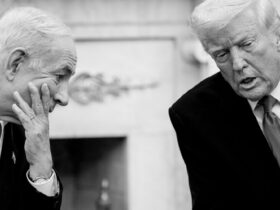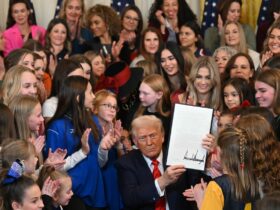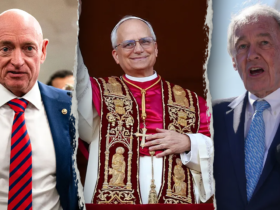Read a few comments. If you enjoy what I do, please support me on Ko-fi! Thank you.
Questions:
1. Outgoing President Joe Biden warns oligarchy is taking shape in America in his farewell address. How much do you perceive this as a problem and do you think it may lead to democratic standards in America?
2. What do you think will be the main focus of the second Donald Trump administration domestically? He cannot run again (though he might want to run again), so what kind of legacy he wants to leave?
Answers:
Tim Galsworthy, Lecturer in History & Military History, Bishop Grosseteste University
1. Joe Biden’s farewell speech struck a similar tone as Dwight Eisenhower’s 64 years ago – a parallel the outgoing president himself acknowledged. Biden’s warnings about an “oligarchy” of “extreme wealth, power and influence”, especially a “tech-industrial complex”, are well-founded and urgent. Most noticeably, leading tech billionaires – Musk, Bezos, and Zuckerberg – have all come calling to the court of Trump. These men are on-board with MAGA 2.0 to vary degrees and for differing self-interested purposes. What is clear is that the leading lights of the “tech-industrial complex” see opportunities for deregulation, further monopolisation of the media market, and above all else: profit. A billionaire president surrounded by a court of self-serving billionaires will not act with the best interests of average Americans or American democracy at heart.
The incoming administration is not just a threat to democratic standards because of the president-elect’s unwillingness to abide by democratic norms, it is a threat because modern-day Citizen Kane figures are lining up to reshape American media and laws to their whims. Although, whether this cozy Trump-tech bro relationship will endure is open to question. I am not sure how long Trump will abide with taunts of “President Musk” from his political opponents!
2. Beyond revenge on his political opponents and a vague sense of “owning the libs (Democrats)”, I am not convinced Trump has any real coherent domestic policy vision. When he came to power in 2017, Trump seemed most concerned with attacking and erasing any policies associated with the Obama White House. Expect the same this time around with the Biden White House. Trump and his sycophantic cabinet will throw meat to their base on culture war issues – the re-renaming of military bases after Confederate generals, attacks on LGBTQ+ rights, criticism of all things associated with DEI – but, as most Americans will always be primarily considered about the economy, he will need to do more. I expect attacks on democratic norms to continue – he will pursue those politicians he sees as his enemies, in what ways remains to be seen, although further politicisation of American courts seems likely.
Do not rule out attempts by Trump and his closest allies to subvert the two-term limit, although this will likely provoke challenge from other Republicans – most noticeably JD Vance and his supporters (especially the power behind the throne Peter Thiel) – eager to take the presidency on a Trumpist platform in 2028. In reality, Trump may only have two years to fully impose his will – given that the 2026 midterms will likely cut into the current triumvirate of Republican control. Do not expect months of a victory lap, as we saw in 2017, Trump and his team will be getting to work – whatever that means – from day 1 this time. Above all, Trump is an unpredictable maverick. That means his domestic policy, like his foreign policy, could veer off in whatever incoherent direction Trump picks up from Fox News or social media in the next four years.
Diana Carlin, Professor Emerita of Communication, Saint Louis University
The country is still governed by those who are elected by the voters. However, with the rise in dark money following the Supreme Court’s Citizens United decision, it is much easier for a few with nearly limitless dollars to influence an election and officeholders to ensure that their agendas are met and their assets protected. Those with money have always had influence on lawmakers through lobbying and supporting candidates, and in that sense this is not a new problem. What Biden perceived as the real threat was what he called the Tech-Industrial Complex which described without using names, Elon Musk, Mark Zuckerberg, and Jeff Bezos–three of the world’s wealthiest men. They have access to the future president in ways many others with money don’t, and Musk along with one of Trump’s primary opponents, Vivek Ramaswamy, have a role that could affect government agencies and structure through the non-governmental Department of Government Efficiency (DOGE) in ways that Congress might not be able to control.
When that is coupled with the level of misinformation on social media platforms and the decision by Facebook to no longer fact check, Biden foresees a lack of trusted information to help the average citizen understand and ultimately control with votes what might need to be done to rein it all in if the average citizen is going to be hurt for the power and profit they will secure. I don’t know what democratic standards might come from the situation Biden described, but in his speech he challenged the American people to address the problem.
2. Donald Trump campaigned on several major issues: the economy, the border, crime, and the need to end wars. He most likely wants his domestic legacy to be one of lowering inflation and consumer prices and expanding jobs in sectors that have suffered such as coal and manufacturing. On the border, he wants to point to large numbers deported. And he wants to take as much credit as possible for the end of the conflict in Gaza which still has to be finalized and then has to be implemented under his administration’s watch. He tied immigration to rising crime rates at a time when violent crime has gone down in the US and most of it is not tied to immigrants or undocumented workers. Trump will take advantage of any further decline and is likely to tie it to his border policies even if the demographics of perpetrators remains as it is. His first targets for deportation are those who have commited property crimes to prevent their crimes from escalating and those who perpetrated violence against women. The House, with Democrats’ support, has passed two measures.
Achieving his goals is complicated because his economic policies include tariffs that will further raise prices on consumer goods. Some consumer goods such as eggs are impacted by the avian flu which Trump cannot control, and deportation of farm and construction workers that will also raise prices when substitute workers can’t be found. Biden did more than Trump to increase manufacturing jobs and some of Biden’s legislation will bear fruit during the Trump administration because of the time it takes for startups. Biden reminded his audience of that fact in his farewell address. Trump is still likely to take credit and will undoubtedly claim it as part of his legacy as well.
What most presidents who run on domestic policy–and most do because many Americans are concerned about pocketbook and social issues more than global concerns–is that the world often creates conditions such as wars and pandemics that are out of a president’s control and can impact the domestic agenda. How severe those outside influences are on the American economy and electorate is as unpredictable as the unknown dangers are now.
Michael Kraft, Emeritus Professor, University of Wisconsin – Green Bay
1. First, Biden’s comments about the rise of oligarchy in the US were somewhat unexpected, but I take them as a warning about what the new Trump administration will bring to office in terms of new policy directions and the kinds of people he is appointing to key positions in his administration. Trump’s preference for wealthy appointees is nothing new, and Democrats have long complained about Trump’s close connections with billionaires and his desire to improve their lot in life while ignore the needs of what we might call ordinary or middle class and working-class Americans. Indeed, the Republican Party itself has long favored policies that benefit the well-off in comparison to the middle class or working Americans. This has been the case for many decades, and goes back to the 1930s and even earlier.
Biden’s warning, however, is a little different. He fears that the new Trump administration will move the inequality in both economic well-being and political power even more sharply towards the wealthy, especially toward the very wealthy. By using the term “oligarchy,” he is perhaps suggesting something similar to what we see in Russia today, where the very wealthy and well-connected essentially own the nation and direct governmental actions. I fear Biden is right in many ways, at least as reflected in the people Trump is appointing to office and the likelihood that his administration will once more try to cut taxes on the wealthy and corporations and pay for those cuts with drastic reductions in governmental services that serve the broad public well. I have to wonder whether Congress will oppose these actions, and I fear its members will not do so strongly enough. It all goes back to campaign contributions and the rising political influence of the very wealthy in this nation. In many ways, I think the 2024 elections already reflect the power of the wealthy and well-connected given the enormous amount of money they poured into campaigns.
2. As to what the new Trump administration will try to do and what Trump’s legacy will be, I think we’ll see more of what he did from 2017 through 2021. Only this time he and his top advisers know where his opposition is, and at least for the next two years his party also controls both the House and Senate. Thus, there will be fewer political constraints on what he tries to do. We’ll know more in a few months. Domestically, he is focused on renewal of his massive tax cuts for the wealthy and corporations even though it will be exceedingly hard to pay for those cuts this time around. He also clearly wants to see a major shrinkage of the federal government and of regulatory actions (the so-called Deep State). Both will be difficult to do since there isn’t that much political support for cutting popular programs. All presidents are constrained by what the public will tolerate and by what Congress and the courts are willing to accept, and it will be no different for Trump.
I don’t know if Trump thinks that much in terms of his political legacy, but I hope he does. He could be remembered for significant policy advances both domestically and globally, or he could fail to do much of anything well and incur the wrath of the public and other nations, especially if the economic suffers and inflation rises. Does he care? I think he wants to be remembered as a success, and that in turn may limit the damage he can inflict on the nation and the world. In the meantime, many of us are thankful for the US system of checks and balances, especially with the power of Congress, the courts, and state governments. And of the power of the private sector to stop what it may see as unnecessary or damaging policy moves. As noted, in the end, all presidents, even Trump, are constrained by public opinion, and concerns about future elections, and I suspect Trump will learn this lesson well. I can only hope that the nation’s weakened and ineffective media can report Trump’s actions and effects well enough that the public can see what is going on.
Robert Busby, Senior Lecturer in Politics, Liverpool Hope University
1. I don’t think that there should be a fear of the emergence of an oligarchy in the US. While there may be some degree of concern about Musk having an undue influence on Trump he is there because he has a political role to play and a job to do. American politics is strongly shaped by financial considerations and the presence of the world’s richest person in the political realm is not really a surprise. The difference in this instance is that Musk has a more public profile and played a more prominent role in the campaign. In many respects his visibility will entail more accountability as each action he takes will be subject to intense scrutiny. Musk also can have limited political ambitions, being a South African by birth.
2. Trump’s domestic priority will primarily be to address the issue of immigration and the Southern border. He will want to show that he has been true to his promise , across the tenure of his recent political career, that he would get the border under control, build a wall and ensure that uncontrolled entry was ceased. This problem has also prompted announcements of mass deportations, which will be difficult to enact. The number of illegal entries makes it wholly unlikely that Trump can make significant headway in addressing the issue, but symbolically he will want to be seen as being tough on this issue and send a deterrent to those who are considering entering America from Mexico illegally.
His second main priority will be to boost the economy. He is very much a transactional person, who likes to measure issues by numbers, and economic growth will be important to his MAGA mandate. The imposition of tariffs on competing economies will be central to the policy, however there are risks of enhanced trade wars from which no-one will benefit.
I do think that Trump will want to have an international legacy. He will take some credit if the Middle East Gaza conflict can be resolved, and it seems his threat of action may have prompted some promising developments in advance of his arrival in office. I also think he will be keen to take on the Ukraine issue. While that would be challenging to resolve it is the type of legacy, as a peacemaker, that Trump would like. So as much as international affairs will not be central to the minds of most American voters in terms of day to day activity, it may well have a bigger impact on Trump’s legacy if he can aid in resolving difficult challenges.
Filed under: Politics, United States, US politics | Tagged: Donald Trump, Politics, United States, US politics |
















Leave a Reply